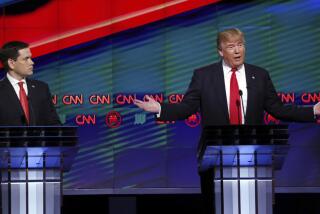Clinton Names Special Envoy for Cuba
- Share via
WASHINGTON — President Clinton appointed a highly regarded trouble-shooter Friday to assuage allies infuriated by a new U.S. law that punishes foreigners who do business with Cuba and to recommend new policies aimed at transforming the troublesome Caribbean nation into a democracy.
The appointment of Undersecretary of Commerce Stuart Eizenstat as special representative for Cuba was announced in a White House statement while Clinton vacationed near Jackson, Wyo.
Eizenstat, 53, who will retain his Commerce post, wants the allies to stop fuming about the new law and direct their energy toward programs aimed at encouraging democracy in Cuba.
He said he hopes to forge a “partnership with our allies . . . that will advance a transition to democracy in Cuba.”
Such an approach, he said, might include channeling foreign aid to nongovernmental Cuban organizations such as human rights groups and encouraging foreign companies in Cuba to adopt business principles that foster democracy.
He said he was thinking of rules like “the Sullivan principles in South Africa, so that if there has to be an investment in Cuba--and of course we do not favor that--but if there is, it will at least promote change.”
The Sullivan principles--set down by U.S. businessman Leon Sullivan--were guidelines the U.S. encouraged American companies to adopt while investing in South Africa more than a decade ago when a ruling white minority there oppressed the black majority. In general, they maintained that investment was permissible in South Africa as long as firms encouraged the advancement of black Africans.
*
Any such plan for Cuba would be watched closely by U.S. businesses eager to compete with European companies investing in Cuba. A U.S. embargo long has prevented such U.S. investment.
But a U.S.-sponsored program that accepted foreign investment in Cuba as long as it promoted democracy would no doubt provoke demands by U.S. corporations that they be allowed to take part as well.
Allied anger rose earlier this year when Congress passed and Clinton signed the new law, adopted after Cuban MIG jets shot down two private planes, killing four Cuban Americans from Miami.
The law, sponsored by Sen. Jesse Helms (R-N.C.) and Rep. Dan Burton (R-Ind.), seeks to punish foreign firms doing business in Cuba on property once owned by Americans, including those who emigrated from Cuba after Fidel Castro came to power in 1959.
Europeans, Canadians and Mexicans with investments in Cuba have denounced the law as a secondary boycott that violates international norms.
In mid-July, Clinton suspended for six months the law’s harshest provision, which lets Americans sue the foreign companies in U.S. courts.
He announced that he would soon appoint a special representative “to forge a common approach with our allies and trading partners.”
Eizenstat said his mission is in line with the act’s intention, as its sponsors wanted “to give the president the opportunity to see if real change could be brought about in the attitudes of our friends and allies, in terms of producing change in Cuba.”
Chief domestic policy advisor to President Carter almost 20 years ago, Eizenstat served for three years as U.S. ambassador to the European Union. He will be assisted by U.N. Ambassador Madeleine Albright and former Rep. Dante Fascell (D-Fla.).
More to Read
Sign up for Essential California
The most important California stories and recommendations in your inbox every morning.
You may occasionally receive promotional content from the Los Angeles Times.










